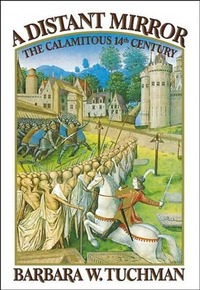Take a photo of a barcode or cover
I'm normally a huge fan of Tuchman's work. _The Guns of August_ and _The Proud Tower_ are two of my favorite books, and I also enjoyed _The Zimmerman Telegram_ and _Stillwell and the American Experience in China_. I own two other of her books and look forward to reading them. That said, I struggled reading one.
Perhaps it was that the people and place names were so unfamiliar to me, or perhaps it was the density of the material, but before I was a third of the way through the book I had lost the thread of the work and no longer cared. On the other hand, the basic setup of the book and the introductory chapters were quite interesting.
Perhaps it was that the people and place names were so unfamiliar to me, or perhaps it was the density of the material, but before I was a third of the way through the book I had lost the thread of the work and no longer cared. On the other hand, the basic setup of the book and the introductory chapters were quite interesting.
medium-paced
funny
informative
medium-paced
I slogged 300 pages into this miserable mishmash of facts and dates before jumping ship. With every new page, I cradled the dying flame of my hope that this might somehow make for an interesting rendition of the middle ages. It did not.
Tuchman somehow manages to overwhelm the reader with information while simultaneously telling you nothing at all. She does this by endlessly shifting context and persistently lacking depth.
For example, she gives overviews of economic, clerical, and societal changes, but she'll constantly jump backwards and forwards in time, making it impossible to keep track of which economic events coincided with which clerical habits, and preventing the easy formation of broad understanding.
She'll gleefully inform the reader of the well-known predominance of the English longbow, but will rob you of any deeper understanding by neglecting to speak on why the French couldn't just use longbows themselves.
When speaking of a continent composed of a dozen varied countries, she will make gross generalizations on behavior or culture, without ever bothering to distinguish between region or social class.
I think this is a work that tries to tackle too much, and does so at the expense of the reader's understanding. Perhaps I will look for another, more focused book.
Tuchman somehow manages to overwhelm the reader with information while simultaneously telling you nothing at all. She does this by endlessly shifting context and persistently lacking depth.
For example, she gives overviews of economic, clerical, and societal changes, but she'll constantly jump backwards and forwards in time, making it impossible to keep track of which economic events coincided with which clerical habits, and preventing the easy formation of broad understanding.
She'll gleefully inform the reader of the well-known predominance of the English longbow, but will rob you of any deeper understanding by neglecting to speak on why the French couldn't just use longbows themselves.
When speaking of a continent composed of a dozen varied countries, she will make gross generalizations on behavior or culture, without ever bothering to distinguish between region or social class.
I think this is a work that tries to tackle too much, and does so at the expense of the reader's understanding. Perhaps I will look for another, more focused book.
dark
informative
reflective
tense
medium-paced
adventurous
informative
reflective
medium-paced
A fascinating work of narrative history. Using Coucy as the vehicle to explore the Hundred Years War and the late 14th century tells this story in a riveting fashion, giving it a sense of place and allowing the reader to have characters to anchor to. My one complaint is that, while Tuchman does cover the resolution of the War in the Epilogue, the second half of the Hundred Years War is doesn't get the same level of detail as the first. Of course, there is much written of Henry V and Joan of Arc, and less written of Poitiers and Crecy, which are arguably more important, and it would function as an entirely second book, but Tuchman's writing is so compelling that I only found myself wishing for more!
dark
informative
reflective
slow-paced
Loaded with info and descriptive scenes. Wish the focus wasn’t so squarely on France and (to a lesser extent) England. The only in-depth information about other countries came when they intersected heavily with France
adventurous
informative
reflective
medium-paced
A wise man once said that history is just a bunch of stuff that happened. A good writer tries to go beyond the burden of literal fact, that a long time ago a a bunch of stuff happened, and teach us about how this relates to us, our experiences, culture, attitudes to love, God and death. Tuchman does this, but only really in the first two hundred pages. She does a great job of being a writer but she's done a lot of research and eventually the writing must disappear and the stuff must start happening. The latter half of her history is weighted down by history as event, and this is partially my fault for being tricked, that exploring 'the 14th century', such a wide lens, would eventually have to mean covering every interminable step in a famously interminable Hundred Years' War where everyone is an asshole named Charles who speaks French. I didn't care as soon as the Black Death ended. The plague should have taken them all.
informative
slow-paced
really fun. definitely drifted in and out of paying attention but overall a really thorough and solid description of medieval life
Graphic: Death, War
Minor: Rape


